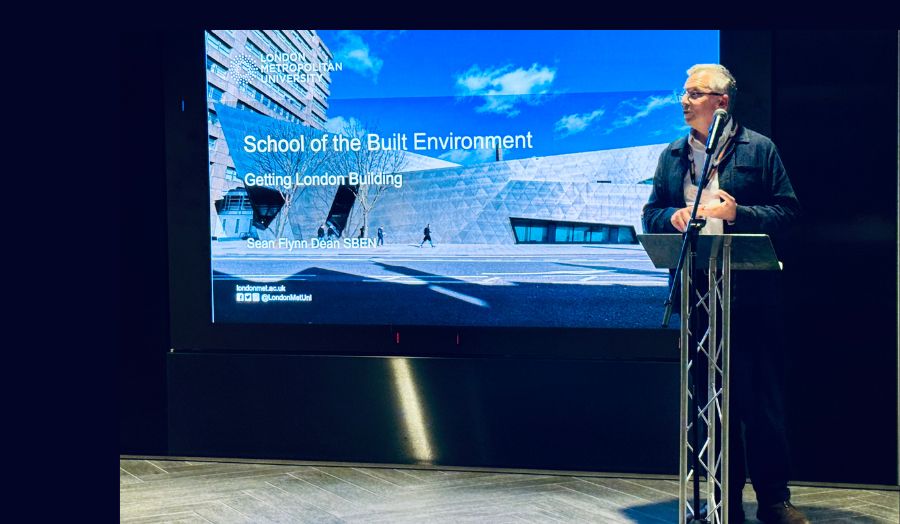Apply for this course
Please select when you would like to start:
This course is subject to validation.
Use the apply button to begin your application.
If you require a Student visa and wish to study a postgraduate course on a part-time basis, please read our how to apply information for international students to ensure you have all the details you need about the application process.
Why study this course?
There’s an increasing demand for skilled construction professionals both in the UK and internationally. This course will provide you with the know-how to effectively add value to projects across the globe. Through authentic learning and assessment, you’ll become an expert quantity surveyor and commercial manager, well-versed in the newest surveying technologies and techniques. You’ll play a crucial part in creating and maintaining a sustainable built environment.
First-class financial management is crucial in the running of all construction projects. On this course, you’ll develop the necessary communication and technical skills needed to lead the project team towards achieving the client’s financial goals. You’ll be able to confidently work through a variety of scenarios, considering matters around culture and nationality and the impact that these matters might have on the industry.
Throughout your studies, you’ll take part in authentic industry-style projects, introducing you to the principles behind quantity surveying practice. Throughout, you’ll have the opportunity to engage with industry standard technologies, enhancing your employability skills, allowing you to contribute to the built environment as a next generation science, technology, engineering, and mathematics (STEM) professional.
You’ll gain first-hand experience of the challenges and opportunities a career within construction has to offer as you visit live construction projects, engage in industry inspired assignments and work creatively towards producing authentic solutions. Our industry links are involved in our curriculum design, career education and guidance provision, working alongside our team of leading academics and practitioners.
What’s more, you’ll have the opportunity to study at our vibrant Holloway campus, located within a short tube ride of the City and West End. Both areas are brimming with excitement, opportunities, and rich cultural experiences.
Benefit from authentic industry interactions
Experience the challenges and opportunities a career within construction has to offer as you visit live construction projects and engage in industry-inspired assignments
Stand out in the job market
Our curriculum is designed to include strategically embedded career development skills to set you apart from the competition
Learn from industry professionals
You'll have the chance to engage with real industry professionals, from practising surveyors and commercial managers to project managers, as well as receiving expert advice from your course academics and practitioners
Course modules
The modules listed below are for the academic year 2024/25 and represent the course modules at this time. Modules and module details (including, but not limited to, location and time) are subject to change over time.
Year modules
Applied Research Project
This module currently runs:all year (September start) - Thursday morning
(core, 60 credits)
The module will provide students with the opportunity to undertake an in-depth study of a subject which is of personal and subject interest in the field of the built environment. Students may focus their research upon a topic or problem relevant to their current programme of study and based upon an academic subject of interest, their current work practice or recent work experience or placement. The submission will take the form of a dissertation.
Students are encouraged to develop their critical thinking and undertake rigorous and theoretically informed research. The module will develop the student’s understanding of the linkages between conceptual issues, subject area, and research methods.
The module will introduce students to research methods and strategies which are appropriate to their area of study. It will provide the student with experience in the planning and implementation of a research project and the subsequent writing up of research findings in a dissertation and encourage students to undertake critical thinking.
Read full detailsBuilt Environment Economics and Finance
This module currently runs:autumn semester - Thursday afternoon
(core, 20 credits)
This module examines the built environment sector, markets, and organisations at a local, national, and international level and the impact of government economic policy and globalisation on the sector. It examines the principles underlying the relationship between economic theory and the built environment sector. You will study how the sector makes effective use of resources and how, in the move towards decarbonising our economies, the environment can be afforded protection through embedding sustainable principles in our practice.
The relationship between business planning activities and corporate objectives will be explored to gain an understanding of the essential elements of a business plan and methods for financial benchmarking. Following on from this the module will explore accounting concepts and principles and you will gain an understanding of the format of management and company accounts and how they are prepared including balance sheets, profit, and loss and cashflow statements.
Throughout the module you will consider how we can leverage big data for businesses decision making in the built environment. With the abundance of available data and analytical tools, organisations recognise the importance of effectively using it to gain a competitive edge. Through utilising data analytics and data visualisation tools, you will develop solutions to scenario-based problems and present them effectively.
Read full detailsConstruction Design and Technology
This module currently runs:autumn semester - Monday morning
spring semester - Monday morning
(core, 20 credits)
The module aims to develop the student’s knowledge and understanding of the
design process and construction technologies. Professionals working in the built environment must have a comprehensive understanding and expertise in sustainable design and manufacturing processes, construction technology, building services, and the application and benefits of building information modelling.
This module introduces you to the various stages of the design, from strategic definition through to technical design. Alongside this it will examine various traditional and modern construction technologies, starting with residential and low-rise construction types before moving on to more complex commercial, industrial, and multi-storey construction typologies. Additionally, you will explore the incorporation of building services such as water, heating, drainage, energy, and data in a sustainable manner, minimizing the environmental impact of construction projects and building operation.
You will consider the impact of factors such as climate change, urbanization, carbon reduction targets, skill shortages, and material availability on the design and manufacturing processes, construction technologies and structural forms adopted by the built environment sector.
You will examine the role of government legislation and regulation in construction, including the significance of workforce safety and building occupant safety during the construction phase and building handover.
By the end of the module, you will have a solid understanding and appreciation of various construction technologies and building services and their contribution towards a sustainable built environment. Moreover, you will have developed valuable technical, research, and critical thinking skills, including a proficiency in interpreting construction information.
Completing this module will enable students to understand and evaluate the role and impact of design and construction technology in fostering a sustainable built environment.
Read full detailsManaging Risk and Uncertainty
This module currently runs:spring semester - Monday afternoon
spring semester - Thursday afternoon
(core, 20 credits)
The aim of this module is to provide the student with knowledge and understanding of risk and uncertainty theories and an appreciation of the differences between risks found on different project types.
Responding to today’s highly complex project landscapes, the module looks at risk management in a contemporary way, including complex projects which involve an unusual degree of uncertainty and unpredictability.
The module will introduce students to risk analysis techniques and how they can help the project team in making decisions under a highly dynamic project landscape. It will provide students with the tools to identify and assess risk and make informed decisions including how to manage risks within the context of a changing project environment. The module looks at “managing change” from the perspective of the risks involved.
By the end of the module students should be able to critically evaluate the following:
- The level of individual element and overall project risk
- Project complexity and risk
- Tools available to manage qualitative and quantitative project risks
- Appropriate means to manage risk
- The links between project change and risks
Procurement and Contract Practice
This module currently runs:autumn semester - Monday afternoon
(core, 20 credits)
The module aims to provide the student with a critical awareness of the processes behind successful procurement and contract management of a construction project. It aims to develop their knowledge and understanding of the legal and contractual context within which construction projects operate and the project context’s which influence the procurement strategy. The module will explain the fundamental concepts of procurement and contracting as well as examining the project procurement management knowledge area processes: plan procurements, conduct procurements, administer procurements, and close procurements. It also covers project outsourcing techniques and tools including soliciting, selecting, and managing subcontractors. It will examine the construction project procurement cycle and the statutory and legal frameworks which need to be accounted for. Particular attention will be given towards sustainable procurement and the influence of an organisation’s Environment, Social and Governance (ESG) Strategy on project finance and procurement.
The knowledge gained will enable the student to propose project contract and procurement strategies for planning, decision making and control.
By the end of the module students should be able to critically evaluate the following:
- the principles of contract law.
- the roles and responsibilities of the contract parties.
- contract selection and procurement routes.
- procurement strategies available for different project types
- the impact of governance on a project procurement strategy for public and private projects
- how a procurement method contributes to an organisation and/or projects ESG goals
- the use of digital tools to aid procurement
- standard form of contracts and their procurement terms.
- techniques to manage disputes towards resolution
Quantity Surveying Practice
This module currently runs:spring semester - Monday morning
autumn semester - Monday morning
(core, 20 credits)
This module will focus on the practice of quantity surveying and will draw upon the knowledge and understanding gained from other modules on the course. The aim of the module is to provide you with a comprehensive understanding of quantity surveying practice in the context of a complete construction project, from both client and contractor perspectives. The objective of the module is to develop the skills necessary to practice as a quantity surveyor in a consultancy or commercial management role.
You will evaluate the factors which affect design economics across the whole building lifecycle, including both capital and lifecycle costs. You will study how a quantity surveyor needs to be expert in cost planning and through doing so gain a detailed knowledge as to how cost planning during the design development stage of a project can assist with the financial control of a project. This will involve you studying aspects of practice which include the rules under which order of cost estimates and elemental cost plans are produced and how value engineering can be used to control project costs. You will gain an understanding of how construction works are quantified and costed, including the use of standard methods of measurement at different stages of the project and the production of pricing documents such as schedules of works and bills of quantities.
Moving on from the design stage you will consider how costs and cashflow can be effectively controlled during the construction phase of a project and appraise principles and practice of controlling and reporting costs on a construction project. You will study methods of cost reporting and forecasting and how to actively manage provisional sums and contingencies.
Throughout the module you will be required to demonstrate knowledge and understanding of the role of the professional bodies, including their expectations regarding ethics, rules of conduct and professionalism. This will require you to demonstrate that you have an awareness of the importance of the principles and practice of client care in quantity surveying practice, and to evaluate the contributions of cultural diversity, gender equality, and intercultural issues to support ethically aware, collaborative professional practice.
Read full detailsSustainable Built Environments
This module currently runs:spring semester - Monday afternoon
(core, 20 credits)
The module aims to develop a critical awareness of the background and drivers for sustainable development. It will explore the development of the sustainability agenda, different approaches to sustainable development and the key trends in society that affect, and are affected by, the built environment. It will consider how climate change, urbanisation and other factors are placing pressure on the built environment across the globe to deliver agile and appropriate responses to challenges such as accelerated climate change, extreme weather and societal change.
The knowledge gained will enable the student to understand the impact of the built environment sector on the sustainability agenda.
By the end of the module students should be able to critically evaluate the following:
- the background behind the sustainability in the built environment agenda
- drivers for change and appropriate responses
- the role of development in maintaining and sustaining the wider environment
- techniques that can be adopted to reduce our built environment operational energy demand
- the different types of infrastructure and their role in achieving sustainable built environments
- strategies to ensure energy security positioned within a low carbon energy mix




















.png)




